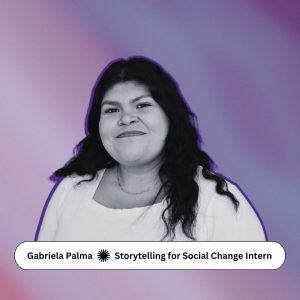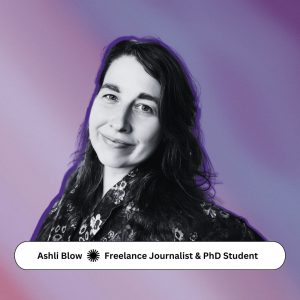By Gabriela Palma
Storytelling for Social Change Intern, Summer 2024
 As a recent graduate from the University of Washington with a degree in Communication and Environmental Health, my passion for science communication stems from a desire to learn about environmental health, share this knowledge with my friends and family, and address the gap between the scientific community and the public.
As a recent graduate from the University of Washington with a degree in Communication and Environmental Health, my passion for science communication stems from a desire to learn about environmental health, share this knowledge with my friends and family, and address the gap between the scientific community and the public.
Science communication is not just about articulating complex scientific issues; it’s also about making science accessible and encouraging people to be part of the solutions. While there has been remarkable progress, challenges still exist that create a divide between people and science.
This is why I was incredibly thrilled to have the opportunity to chat with Ashli Blow, one of the panelists who spoke to the EarthLab summer 2024 internship cohort about her journey as an established science communicator. Ashli is a freelance journalist focused on solutions-oriented journalism and recently graduated from the University of Washington with a Master’s in Environmental Policy from the Evans School of Public Policy and Governance. She also participated in the Future Rivers Program, a member organization of EarthLab.
Q: How would you define science communication?
“If I had to define it, I would take a page out of my incoming doctoral program at the University of Oregon that I’m going to at the Center for Science Communication Research. They talk about science communication as enhancing the conversation between scientists and society. So for me, it’s taking what scientists are doing and breaking it down for the public, and the “public” is a really vague term. Talk about definitions! But for me, that means your everyday person, politicians, educators, and having messages tailored in different ways that resonate with each of those groups. Not necessarily code switching, but adapting it for relevance of why it matters to different people.”
Q: Do you remember the moment you decided that you wanted to write about environmental justice for the first time?
“During the pandemic in 2020, I was very homesick and paying attention to a lot of events happening back in Tennessee. I started reading about people who were virtually protesting a venture that wanted to put a crude oil pipeline through a historically Black community. That was how I realized I can no longer separate justice from what I’m doing with science communication. I’ve had to break off relationships with people in my field who don’t agree with that. But for me there is empirical evidence that shows you cannot talk about climate change without talking about environmental justice or climate justice.”
 Q: You just graduated from the UW Evans School of Public Policy & Governance with an MPA in Environmental Studies—congrats! What prompted you to go back to school, and how has this degree influenced the way you think about communicating environmental science and policy to your readers?
Q: You just graduated from the UW Evans School of Public Policy & Governance with an MPA in Environmental Studies—congrats! What prompted you to go back to school, and how has this degree influenced the way you think about communicating environmental science and policy to your readers?
A: “Thank you! I actually thought for a minute I was going to stay in government work because I wanted to do policy analysis. In 2019, I took a brief break from journalism to work in Washington State’s Department of Natural Resources. The reason I went back to get my Master’s degree at UW was because I was being left out of certain conversations just because I didn’t have a degree. Then during the pandemic, a lot of structures in government were changing to try to meet the moment of COVID. Journalism was also really strained, and they needed support. Ultimately, I did go back to journalism while in school, and I’m really happy that that happened.
My Master’s degree has helped my journalism as well. For example, the Solutions Journalism Network just published my capstone project with the Evans School, which is called “Unpacking Climate Policy.” It’s a roadmap to help science communicators and journalists understand policy effectiveness to create climate solutions-oriented journalism.
Being a journalist and working in communications professionally, I knew I had strong writing skills, but I wanted to understand how to look at numbers better and bring that to readers. You don’t have to be an expert in everything, but I do believe you need to know how to ask questions. So that’s what this degree ultimately did; it helped me think about better ways to ask questions about policy and science, especially when it comes to climate change.
Q: How do you approach writing stories about communities whose lived experiences are overlooked?
A: This is a tough question because I’m obviously a white woman. I feel like I have a responsibility with that privilege to not go in and extract and then tell the story to white people who have not had that lived experience. I think I have definitely done that kind of journalism, and it’s something that I strive to not do. Sometimes that means turning down stories because I’m not the right person to tell them, and then sharing that opportunity with journalists who do have that lived experience and want to tell that story
When it comes to communities that I have a connection to—like in Memphis reporting on the Black community—I still make mistakes and am learning all the time, but those are neighbors I grew up with. I also have to think about my own lived experience. Understanding it on an academic level and being a neighbor still doesn’t mean I understand what it’s like.
This is why my work is centered in relationships and trust. What I usually do is go to an advocacy group, tell them about climate issues I’m interested in covering, and if they have people who want to be amplified, then I’ll have a series of pre-interviews. So we both get to know each other and see if it’s a good fit for the person I’m interviewing. At any time, if they’re like, “You know what, this really actually isn’t right for me,” all I can do is respect that, which is different from what I was taught in my journalism school. I’m still unlearning some of those journalism practices that don’t work for my practice, but I think that’s an approach I have to take at a slower pace. It takes humility and patience in the same way as breaking news takes a kind of diligence.
Q: You mention how some organizations are changing. What guidance do you have for students or early career professionals interested in pursuing science communication?
A: My best advice is to just get experience, and I’ll put an asterisk on that that I’ll get to in a moment. It’s important to get out there and see how the sausage is made. It might mean you’re doing science communication that you don’t necessarily love. For example, one of the projects I had was about cleaning up poop from waterways, and it was not glamorous, but it was a good experience.
The asterisk mentioned, for me, it was always a balance between accepting assignments for experience versus speaking up to start getting more work that I wanted that aligned with my values. That’s something that came with time. The caveat is don’t stay in an environment that is toxic just for experience. Find that baseline of safety for yourself and take care of your mental health.
Q: We’re living in a polarizing time, politically, environmentally, and socially. What do you think about science communications’ role in combating misinformation and disinformation? And what gives you hope?
A: Yes, it plays a huge role! I think a facts-first approach covers you. When I worked at the Department of Natural Resources, talking about the need for wildfire funding, you have to present facts, not opinion. Going back to the science communication definition, if society can have a better relationship with science, then I think that combats misinformation and disinformation.
What gives me hope about all of this is going back to how journalism, in some aspects, is changing. That’s because of the people who are there. It’s people who are changing. There are people who have different perspectives and different lived experiences than journalists and communicators of the past. It is a reckoning journalism is having, and what you get with that is not just better science reporting, but that’s also where that justice piece comes in. People who have the experience or relationships with folks to go into communities on the front lines and talk to them in an authentic way that’s not extractive. I have a lot of hope for what that means for journalism and what society gains from science communication.
Introducing NextGen Narratives, a fresh addition to the EarthLab news page, tailored for University of Washington students to express how they’re thinking about taking equitable climate action in a variety of ways. If you’re a student eager to join NextGen Narratives, don’t hesitate to contact Allie Long, EarthLab’s Communications Lead, at alongs@uw.edu.